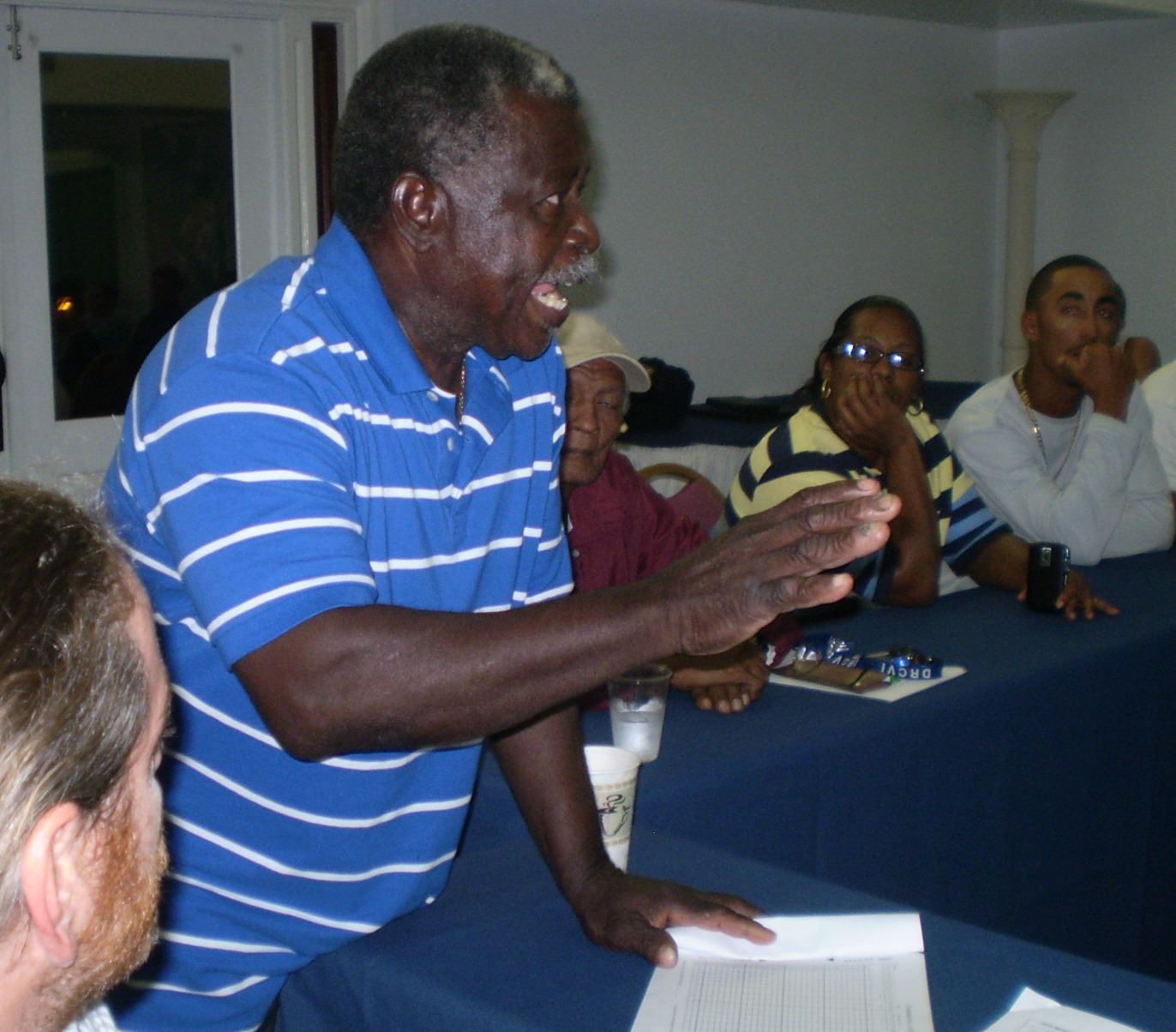
At the heart of the matter is a data collection system proposed by the federal government—a system that local fishermen see as onerous and impractical.
Are V.I. fisheries on the verge of collapse due to overfishing, as the government contends, or are commercial fisherman being overburdened by needless federal regulations? This is the central question underlying the contentious debates at recent meetings between fishermen and members of the National Marine Fisheries Service (NMFS).
Organized by DPNR’s Division of Fish and Wildlife, the meetings’ stated objective has been to get input from local fisherman on the proposed data collection system, known officially as the U.S. Caribbean Data Collection Improvement Project.
The proposed data system originated in response to V.I. fishermen’s argument that the V.I. fishery was unique and that information from Puerto Rico should not be used to determine catch limits here. The Caribbean Fishery Management Council last year agreed that when it comes to setting catch limits in the Virgin Islands, it will use fish-count data only from the Virgin Islands.
The proposed system—presented by Robert Trumble of Marine Resources Assessment Group (MRAG), an independent consulting business currently under contract with DPNR to promoting sustainable fisheries—would require fishermen to turn in more specific data concerning the area a fish was caught, the fish’s type, and the gear used in catching it.
Trumble said officials want to make the data collection as easy as possible for the fishermen. He said some data could simply be provided using check boxes. “If you don’t want to participate at least give us help with input,” Trumble said to the roughly 20 fishermen and -women gathered Monday.
NMFS official Steve Turner said Monday the system’s goal is to get the highest quality data to determine what is happening with the stock. New catch limits must be in place by 2010, according to the federally mandated Magnuson-Stevens Act.
At the two public meetings on St. Croix, many fisherman mixed complaints about what they saw as an onerous collection system with complaints about fishing areas that have been closed to them in the past and the banning of gill nets.
Many fishermen, like Tom Daley, are also troubled by the information requested by the proposed system. Specifically, Daley objected to providing information on his fish traps. “There is no reason for you to have that information,” he said. “Those are trade secrets.”
That is not the only information that fisherman don’t want to provide. Edward Schuster, president of the St. Croix Commercial Fishermen’s Association, said giving out smaller grid information would be like giving out his credit card numbers. Schuster said there is a fear among the fishermen that data from a smaller grid could lead to additional area closures.
Other things besides the collection methods appear to be adding to the contentiousness of the meeting. There seems to be little confidence from the fishermen that the scientists and federal officials will do what’s best for them. “There appears to be a smoke screen that angers me,” Schuster said. “You will go back and tell your bosses one thing, and managers will do something else.”
The lack of trust felt by many fishermen is not a new development. In an official summary, dated Oct. 26, of private meetings with fishermen—before the public meetings began—officials noted that fishermen perceived the data collection project as an effort by scientists to shut the fishery down.
Although V.I. fishermen have been reluctant to embrace the proposed system, they do appear ready to agree on some reporting changes. Several indicated that they could live with report catches every two weeks instead of the present monthly report. They also agree to give hook and line information, figures on water depth, data on the number of divers and scuba gear used, and the start and finish times of fishing trips.
Although they would not agree to a smaller grid system, they did agree to give information on two or three sub-zones in the six major zones in the waters of St. Croix.
Another sore spot revealed at the Buccaneer Monday is the fact that St. Thomas fishermen were not represented at the St. Croix meetings. Ruth Gomez, an environmental specialist at DPNR on St Thomas, said, “You should have made sure at least one fisherman was here from St. Thomas. It is imperative they are represented.” Gomez added that she has to deal with fishermen who are angry about not being included in the meetings on St. Croix.
DPNR’s Toby Tobias said there will be a meeting on St. Thomas to accommodate the fishermen there, but he was not sure when. He said DPNR didn’t get St. Thomas fishermen to St. Croix because transportation funds are lacking. Trumble also assured the fishermen that there will be more outreach and discussions before fine-tuning the proposed system.
V.I. Fishermen Yet to Embrace Proposed Federal Regulations
Keeping our community informed is our top priority.
If you have a news tip to share, please call or text us at 340-228-8784.
If you have a news tip to share, please call or text us at 340-228-8784.
Support local + independent journalism in the U.S. Virgin Islands
Unlike many news organizations, we haven't put up a paywall – we want to keep our journalism as accessible as we can. Our independent journalism costs time, money and hard work to keep you informed, but we do it because we believe that it matters. We know that informed communities are empowered ones. If you appreciate our reporting and want to help make our future more secure, please consider donating.





